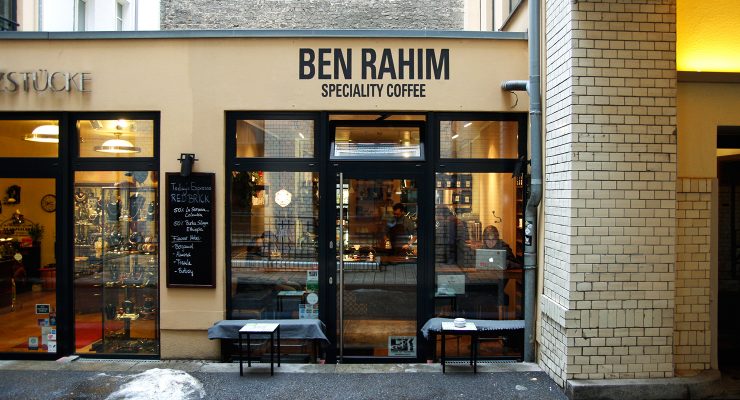 Since March 2015, Berlin coffee lovers in the know have been turning away from the buzzing Hackesche Höfe to Sophienstrasse, following a black sign propped up on the pavement, and nipping through a courtyard, to find Ben Rahim Speciality Coffee.
Since March 2015, Berlin coffee lovers in the know have been turning away from the buzzing Hackesche Höfe to Sophienstrasse, following a black sign propped up on the pavement, and nipping through a courtyard, to find Ben Rahim Speciality Coffee.
Thanks to the somewhat furtive location, Ben Rahim feels like a private getaway, a moment’s reprieve from the bustle of Mitte and the blistering wind that rips the streets in winter.
The space was conceived by the Tunisian-born Ben Rahim to be something different: a specialty coffee store in Berlin with an Arabic slant. The décor is distinct from your typical Mitte pairing of soft wood and metal. The glass façade of the one-room cafe faces the inner courtyard. Inside, small wooden tables and benches—best suited for solo travelers and intimate pairs—hug the cafe’s edges and line the window in a horseshoe. The Portland-gray walls and floorboards are lined with Persian rugs, the counter and walls adorned with Islamic tessellated tile highlights, and the space softly lit by a 48-sided geometric lamp.
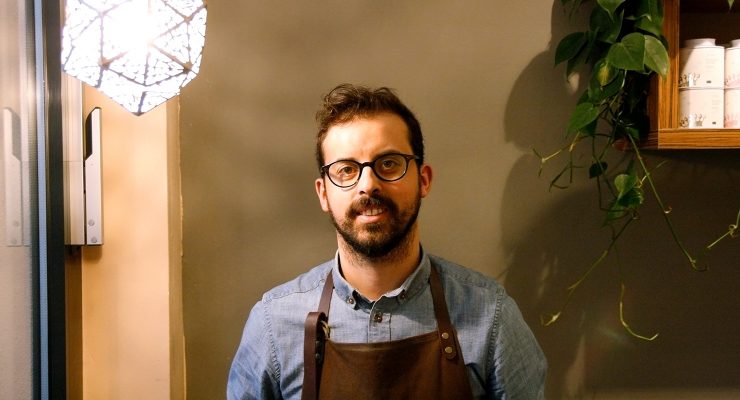
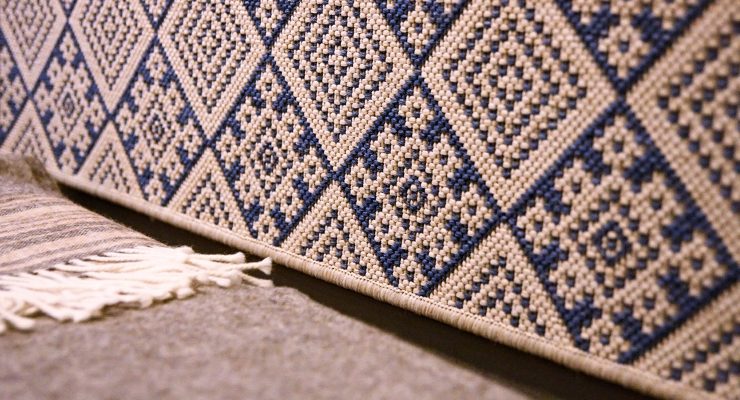
The mixed décor was all hand-picked item by item by Rahim, sourced from a mixture of Berlin stores and abroad—including the Tunisian painted ceramic plates that hold homemade Sidi Bou baklava, Casablanca cake, Carthago cookies, and other pastries. A West African soundtrack of Tuareg and jazz sets the mood, with the mellow sounds of the Mlimani Park Orchestra from Tanzania playing during my last visit.
On the central counter sits a Nuova Simonelli Aurelia II, as Rahim serves espresso and V60 options, all brewed with beans from London’s Square Mile Coffee Roasters and ground on a Nuova Simonelli Mythos One. He uses a VST LAB Coffee III Refractometer and their ExtractMojo app to hit the sweet spot between 18-20%. But I’m here to try the mocca—a brew method known by many names, including Turkish coffee, cezve/ibrik, and more. While mocca is cheap and plentiful across Berlin’s many Turkish and African cafes, I’ve never seen it before at a specialty coffee cafe or brewed to the same exacting standards as somewhere like The Barn, where Rahim previously worked as a senior barista.
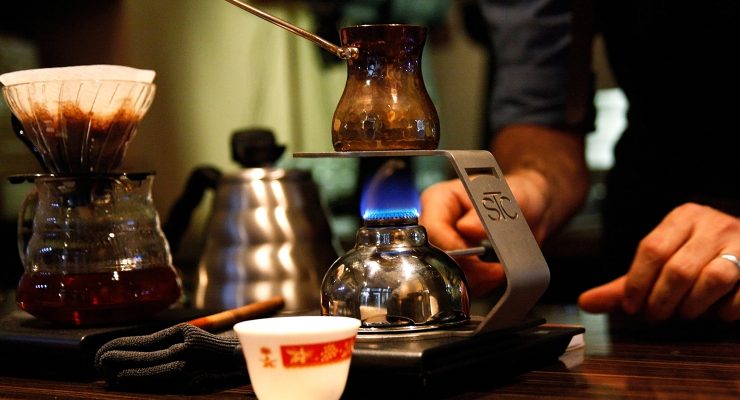
In Tunisia, Rahim grew up surrounded by tea and coffee, which hold a central cultural place. “Always, there is coffee or tea,” Rahim told me. “Instead of describing flavors—for example, this coffee is fruity and chocolatey—Tunisians often speak of their coffees as different types of friends.”
Rahim left Tunisia for Australia seven years ago, where he first started working as a barista. In that time he witnessed numerous waves and trends sweep the coffee scene. “But there has been no wave with mocca,” he said. “It is always the same, no one cares about the mocca.” When he opened his own space, he set about trying to change this. He wanted to show that when treated with the right beans, equipment, and attention to craft, the mocca can become something special and worthy of attention. “I want people to have a good, good experience with mocca.”
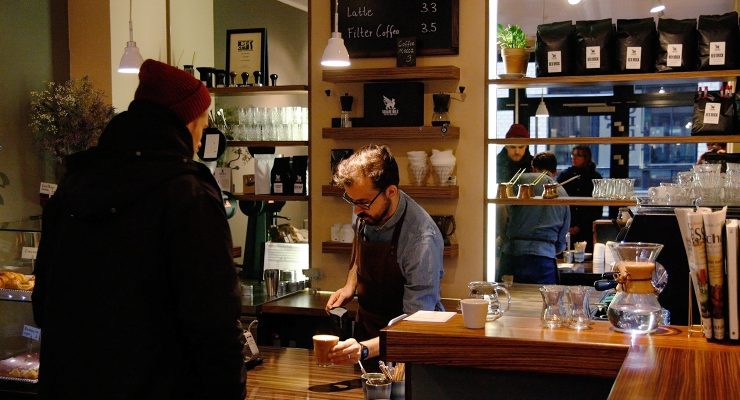
On my visit, Rahim prepared the mocca with El Salvador Kilimanjaro Natural from Square Mile, ground on a Mahlkönig EK 43. Rahim adds seven grams of ground coffee and water heated to sixty degrees Celsius to a heavy, dappled copper cezve with a long handle. The cezve is placed over the open flame of an butane burner, gently brewing for several minutes, and Rahim stirs with an olive wood paddle to ensure no grinds stick to the sides or bottom.
After months of searching and experimenting for the right setup—scouring everything from the city’s cheap Turkish stores to further abroad—Rahim got in contact with Turgay Yildizli, three-time Turkish Cezve/Ibrik Champion and 2013 World Coffee Events World Cezve/Ibrik Champion and a rock star of the Turkish coffee scene. Yildizli developed and sells Specialty Turkish Coffee brand equipment, including the Copper Pot, single Coffee Stand, and the butane burner now used by Rahim.
The setup is visually arresting, and curious visitors constantly ask questions, or alternately, recognize the mocca, surprised to see it in a specialty coffee space. Rahim’s mocca is served on a Turkish coffee cup and saucer, with a single date in place of a sweet biscuit or chocolate.
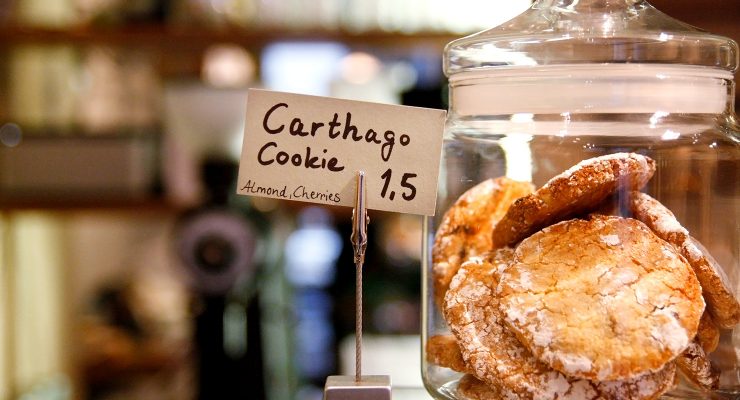
Rahim suggests to let the coffee cool, allowing the grounds to settle. The mocca is designed to be sipped slowly, enjoying first the thick top layer, and then the smooth, gentle, chocolatey flavors, which emerge more fully as the coffee loses heat and thickens.
Last November, Rahim hoped to compete in the Turkish coffee category at the German Barista Championships in Munich, and although the organizers were keen, not enough applicants registered to make the event feasible. If the mocca wave catches on, maybe he’ll get his chance in 2016.
Ben Rahim Speciality Coffee is located at Sophienstrasse 7, Berlin. Visit their official website and follow them on Facebook, Twitter, and Instagram.
Annabel Brady-Brown is a freelance journalist based in Berlin, writing for ExBerliner and more. Read more Annabel Brady-Brown on Sprudge.
Photos by Septimus Brope.
The post Berlin’s Ben Rahim Is A Private Coffee Gateway appeared first on Sprudge.

